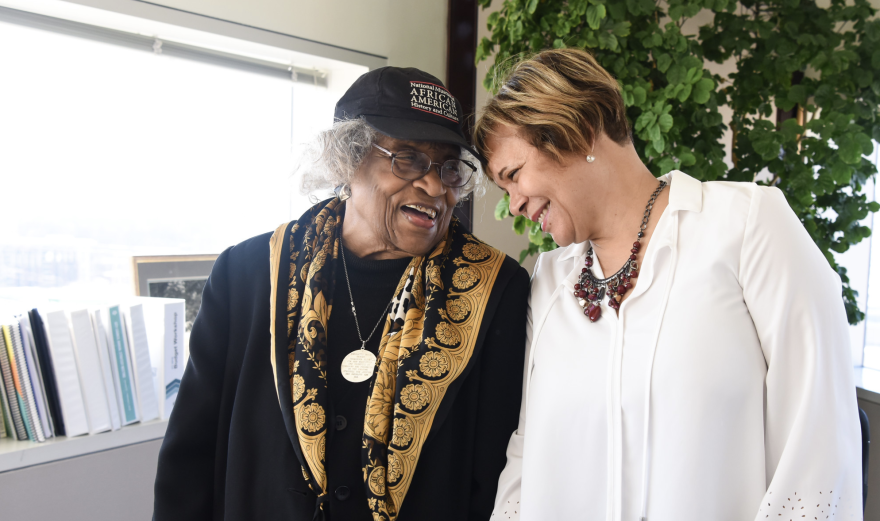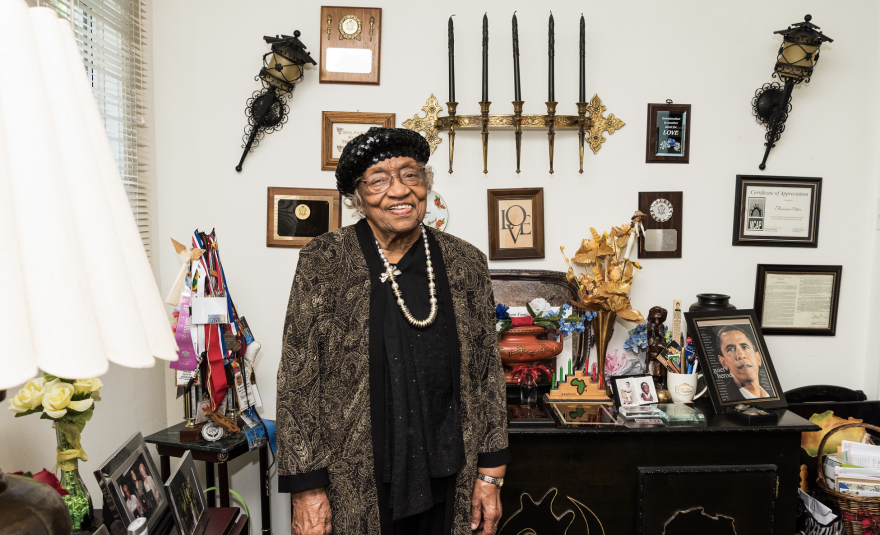Thereasea Elder, the first Black public health nurse in Mecklenburg County, died Tuesday at the age of 93. And while a community mourns her passing, her decades-long dedication to service continues to inspire those who knew her.
Hannah Terrell, branch leader of Allegra Westbrooks Regional Library, still has an almost two-year-old voice message from Elder. Elder praised Terrell’s community work but also encouraged her to “pass on the torch.”
Terrell said being in Elder’s presence inspired her to continue her work documenting Black history and engaging with the community. And even though she met Elder in person only a handful of times, there was a lasting impact.
“She is somebody that you want to be around,” Terrell said. “You want to be at her feet. You want to listen. You want to take in everything. When she is giving you that charge, your ears are wide open.”
Thereasea Delerine Clark was born to Booker T and Odessa of Lancaster, South Carolina, on Sept. 2, 1927.

The roots of Elder’s future as a leader, healer and transformer of Charlotte started in the close-knit Black community of Greenville.
“They (the neighbors) shared clothing, flowers, vegetables … everyone shared everything,” Elder said in a 1993 oral history for John Hope Franklin Research Center for African and African American History and Culture at Duke University. “The whole community cared for that community.”
Her father worked as a porter and her mother did domestic work in homes. Education was always stressed in her family, and from a young age, Elder knew what she wanted to do.
As a high school student at West Charlotte High School, Elder began working with Charlotte Memorial Hospital. Because of segregation, she remained largely behind the scenes and rarely interacted with patients.
Upon graduation in 1944, Elder attended Johnson C. Smith University for one year before transferring to North Carolina Central University to study nursing. In a 2001 oral history with the University of North Carolina Charlotte’s J. Murrey Atkins Library, Elder remembers being inspired by the outreach and engagement between her program and the Durham community.
While at NC Central, Elder was part of the United States Nurse Corps, a program enacted during the 1940s to address a nursing shortage in the United States.
On Aug. 16, 1948, she married Wille Elder, who also grew up in Charlotte’s Greenville neighborhood. They later had two sons, Ronald and Cedric.
That year, Thereasea Elder also began working at Good Samaritan Hospital, which was the only hospital for Black residents in the area. For 18 years, she worked in the maternity ward before leaving to work for Mecklenburg County as a public health nurse.
After working with local schools in a predominantly Black area, she and another Black nurse were assigned to Paw Creek, which she described as “Klan Country” in her 2001 oral history with UNCC.
“We weren’t aware of those things until we started reading about them. We didn’t know how bad it was until we were grown,” said Ronald Elder, her oldest son.
“Some of the things she was running into in the homes were being called a racially charged name. I don’t recall her ever saying she faced any violence, but she did face a lot of people that had very negative views and expressed them towards people of color. She wanted to give the best care to people she was trying to help regardless of how they felt towards her,” he said.
In her oral history with UNCC, Elder said she faced problems from both other white nurses and patients. She said some patients asked her to take out the trash and others had Confederate flags draped from the ceilings.
The county “also told us if integration was going to work, it was left up to us,” Elder said in the 2001 interview. “Whatever came up, we had to handle it. They felt that we could handle it and that we would want to, if Black nurses was going to visit in white homes, it was up to us to do it.”
But wearing her nurse uniform added a layer of respect and safety.
“You were taught to wear your uniform and cap, and everybody respects the public health nurse uniform and her cap, and I knew better than not to wear it,” Elder said in the 2001 interview.
As a public health nurse, Elder had close ties with the families in the communities she served.
“They (public health nurses) knew every family. They knew every household. There wasn't anyone in Charlotte-Mecklenburg that the public health nurse — Black or white — could not tell you something about that family,” Elder remembered in the same 2001 interview, adding that her knowledge aided others working in public service.
“Even the police department used to use the knowledge of the public health nurse, because they ... knew all of the families in the areas where they worked.”

When Elder wasn’t making history, she was documenting it.
After retiring from the county in 1989, Elder established the Greenville Historical Society as well as the Charlotte Mecklenburg Black Heritage Committee to document the community she grew up with. She also founded the Charlotte Club of the National Association of Negro Business and Professional Women’s Clubs.
Everett Blackmon, the circulation services manager of the Charlotte Mecklenburg Library, also documents the city’s culture and history. Blackmon worked closely with Elder in presenting and observing the area’s story and also published “T.D. Elder Living Images: Charlotte's Triumphant Warrior for Black History,” a book of photographs he had taken of her.

Blackmon, who also considered Elder a mentor, says she started documenting history for future generations after one of her grandchildren asked her questions.
“She wanted to be able to give them good and accurate history,” Blackmon said.
And even with her huge impact, Blackmon says her first concern was always the community.
“She served," Blackmon said. "It wasn’t about her being important. It was about the community and who we were, and what we could do together.”




